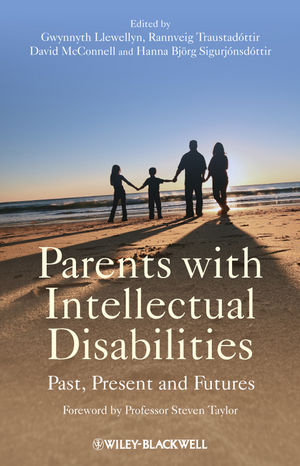Parents with Intellectual Disabilities: Past, Present and FuturesISBN: 978-0-470-77294-2
Paperback
290 pages
May 2010
 This is a Print-on-Demand title. It will be printed specifically to fill your order. Please allow an additional 10-15 days delivery time. The book is not returnable.
Other Available Formats: Hardcover
|
||||||
"Parents With Intellectual Disabilities: Past, Present and Futures is thought provoking worth reading for those working with families with intellectual disabilities." (PsycCRITIQUES, February 2011)
‘Parents with Intellectual Disabilities: Past, Present and Futures is essential reading for anyone interested in the lives of parents with intellectual disabilities, and it is recommended reading for everyone in the broader field of developmental disabilities. It provides a synthesis of current research and practice, along with clear picture of the challenges ahead. Its contents are both comprehensive and compassionate. The international authorship provides an important global perspective.’—Dr Dick Sobsey, University of Alberta, Canada
‘The birth of a new child tends to be a happy event, but
if parents are intellectually disabled it is likely to be
associated with "danger" and a case for child protection agencies.
The point of departure of this book, however, is the 2006 UN
Convention on the Rights of Persons with Disabilities, Article 23,
on the elimination of discrimination related to marriage and
family. The book discusses the experiences of parents with
intellectual disabilities and their children, and also supports
such parental training and the role of extended families. It is a
very welcome contribution to a topic that tends to be negatively
oversimplified.’
—Jan Tøssebro, Norwegian University of Science and
Technology
‘This is a unique exploration – from an
international and multi-disciplinary perspective – of the
lives and experiences of parents with intellectual disabilities,
their children and the services that both enable and disable them
in their parenting. Its combination of scholarly research and
"insider" accounts makes it essential reading for researchers and
practitioners around the world.’
—Professor Dorothy Atkinson, The Open University,
UK
‘Parents with Intellectual Disabilities is a
thoughtful and comprehensive collection by an international team
that blazes new trails for inclusion and equality for adults with
intellectual disabilities. By asserting that forming a family and
parenting are pathways both to social value and personal
fulfilment, it challenges us to question our own values and
assumptions about adults with intellectual disabilities as parents.
An essential text for a full understanding of disability in the
world of today and tomorrow.’
—Ivan Brown, Ph.D., Centre of Excellence for Child
Welfare, University of Toronto, Canada
‘A rare achievement, this book integrates clear-eyed analyses of the social circumstances faced by people with intellectual disability who parent or long to parent, strong research on critical aspects of this neglected human rights issue, and creative guidelines for improved practice. We may believe that Eugenics is over, long discredited. But what is its legacy in the lives of people with intellectual disability in relationships, pregnancy, decisions about parenting, and actual parenting? What do their children say? And how can we overcome the remaining barriers of history?
‘This must-read book explores the experiences of mothers
and fathers with intellectual disability and their children,
contextualized within their communities. It investigates the
systems and services that do or do not support successful
parenting, and explores modern complexities of gender, terminology,
citizenship, public policy, and human rights.’
—Ruth Luckasson, Distinguished Professor of Education,
University of New Mexico, US



